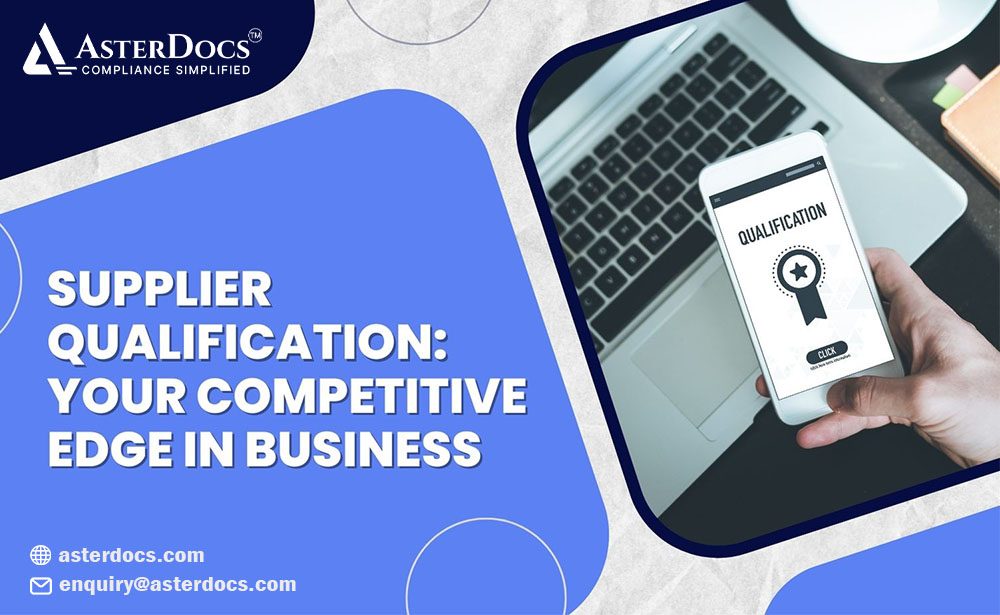In today’s competitive business landscape, gaining an edge over rivals is crucial for long-term success. While many factors contribute to a company’s competitive advantage, one often overlooked aspect is supplier qualification.
By implementing robust supplier qualification processes, businesses can unlock significant benefits and establish themselves as leaders in their respective industries. In this blog, we will explore how supplier qualification serves as a competitive advantage and why it should be a priority for every forward-thinking organization.
#1 Ensuring Product Quality and Consistency:
When it comes to delivering products that meet or exceed customer expectations, consistent quality is paramount. Supplier qualification plays a crucial role in ensuring product quality and consistency in the following ways-
- Implementing rigorous quality control measures through supplier qualification to ensure consistent product quality.
- Selecting suppliers with a proven track record of delivering high-quality products.
- Conducting regular audits and inspections to maintain standards and reduce defects.
Enhancing customer satisfaction and building a reputation for reliable and superior products.
#2 Mitigating Supply Chain Risks:
In today’s interconnected global economy, supply chain disruptions can have severe consequences for businesses. Supplier qualification empowers organizations to proactively assess and manage supply chain risks in the following ways-
- Assessing suppliers’ financial stability to minimize the risk of disruptions or supplier bankruptcies.
- Evaluating suppliers’ production capacity and capabilities to meet demand and avoid supply shortages.
- Diversifying the supplier base geographically to mitigate the impact of regional disruptions.
- Developing contingency plans and backup suppliers to maintain business continuity during unforeseen events.
#3 Ensuring Regulatory Compliance and Ethical Standards:
In an era where consumers value transparency and responsible business practices, regulatory compliance and ethical standards are crucial considerations. Supplier qualification allows businesses to ensure that their suppliers adhere to relevant laws, regulations, and industry certifications in the following ways-
- Selecting suppliers who adhere to relevant laws, regulations, and industry certifications.
- Ensuring ethical sourcing practices, such as fair trade, environmental sustainability, and labor standards.
- Mitigating legal and reputational risks associated with non-compliance.
- Building trust with customers who value responsible and ethical business practices.
#4 Driving Innovation and Collaboration:
Innovation is a key driver of success in today’s dynamic business landscape. Supplier qualification enables businesses to foster strong partnerships and collaboration with suppliers in the following ways-
- Collaborating with qualified suppliers to exchange ideas, insights, and best practices.
- Partnering with suppliers who demonstrate a commitment to continuous improvement and innovation.
- Co-creating new products, exploring new technologies, and sharing market intelligence.
- Gaining a competitive edge by staying at the forefront of industry trends and customer demands.
#5 Cost Efficiency and Financial Savings:
Optimizing costs and achieving financial savings is a priority for every business. Effective supplier qualifications play a crucial role in cost efficiency. By selecting suppliers with competitive pricing, favorable terms, and efficient production capabilities, businesses can improve their cost structures.
- Negotiating favorable terms, pricing models, and volume discounts with qualified suppliers.
- Leveraging supplier expertise and efficiency to optimize costs in the supply chain.
- Streamlining processes and reducing waste through collaboration and supplier partnerships.
- Improving profitability by achieving cost efficiencies and competitive pricing.
#6 Building Long-term Relationships and Trust:
In the world of business, building long-term relationships based on trust and mutual growth is invaluable. Supplier qualification serves as a foundation for establishing strong partnerships with reliable suppliers who align with an organization’s values and goals. You can leverage supplier qualification for the following-
- Investing in long-term relationships with qualified suppliers based on trust and mutual growth.
- Engaging in open communication and transparency with suppliers.
- Establishing preferential treatment, access to exclusive resources, and collaborative opportunities.
- Strengthening the supply chain and fostering loyalty, reliability, and stability in the partnership.
The Bottom Line
Supplier qualification offers a range of advantages that contribute to a competitive edge in the marketplace. By ensuring product quality and consistency, mitigating supply chain risks, complying with regulations and ethical standards, driving innovation and collaboration, achieving cost efficiencies, and building long-term relationships, businesses can establish themselves as industry leaders.
Prioritizing supplier qualification is essential for organizations looking to thrive in today’s competitive business environment and secure a distinct advantage in their respective industries.













